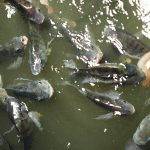Fish farming in Nigeria is a lucrative business that can fetch you millions of naira. All you need is the correct information and how to go about it.
Many people venture into fish farming in Nigeria without the right information, bringing them running at a loss in the fish farming business.
To save you from suffering that same fate or losing your investment, I have come up with this article that’ll guide you and show you the things to put in place to run a successful fish farm in Nigeria.
Table of Contents
What is Fish Farming?
Fish farming involves the rearing and breeding of fish or other aquatic animals for commercial purposes. It is also called Pisciculture or Aquaculture.
The sole aim of rearing fish is to provide food since fish is one of the cheapest protein sources. It also has many nutritional values compared to some other proteinous foods.
To run a successful fish farm in Nigeria, there are various things we have to put in place for good productivity. I have grouped them into a few points for better understanding below.
How to Run a Successful Fish Farm in Nigeria
-
Get a piece of land for your pond
In every business, getting a suitable space for daily activities is the first and foremost step.
Since fishes are animals that do not disturb or create noise, they can be reared almost anywhere, but better still, it is best to get land where your farm will be situated permanently.
You can buy or rent land (1 plot, 2 plots, or even ¼ plot, depending on how big you want your farm to be).
-
Look for a source of clean water
We all know that fish cannot survive without water. If you want to venture into fish farming in Nigeria, you will be required to produce a source of clean water.
It could be a well or a borehole, provided that the water source is clean and suitable for its purpose.
You’ll also have to provide a water reservoir or tank, which will be used in storing and supplying water on the farm.
-
Build a well-designed pond
A pond is a place where fish are kept. There are mainly three types of ponds;
i. Earthen pond
To make this type of pond, you must dig the soil deep into the ground to the required specification. The pond is cheap to make and has no side effects except that you might be unable to control what goes in and out of your pond.
ii. Concrete pond
A concrete pond is a type of pond that is built using cement, stones, rods, blocks, and sand.
The concrete pond is used mostly in intensive fish farming. The blocks will be built to a certain level, and the inner part will be smoothed with concentrated cement mixed with sand and stones.
It has no side effects, but it is expensive to build.
iii. Tarpaulin pond
This type of fish pond is built using tarpaulin sheets. It is also called a mobile pond, and it can be carried about easily, unlike the other types of ponds. It is also expensive to build and has no side effects.
Read also: How to start a plastic Recycling Business in Nigeria.
-
Get a mentor or go for training
The same way you can’t bake a cake without having a fore knowledge of how to go about mixing the ingredients to yield the best outcome is the same way you can’t go into fish farming in Nigeria and make a profit without guidance or experience, this is where a mentor comes in.
A mentor is someone already in the business or with good knowledge of the business. He would guide you on the dos and don’ts of fish farming, like the best breed of fish to rear, marketing of your produce, a solution to disease, and so on.
This helps you avoid many mistakes and potholes, and you wouldn’t have to learn the hard way. Get a knowledgeable mentor to show you the ropes of fish farming in Nigeria.
-
Get your stock from a reliable source
This is where you get your ROI (return on investment), so it must be handled carefully with proper guidance.
Getting a bad stock can ruin it all, no matter how well you cater for them.
There are various breeds of fish one can rear for commercial purposes, but the most consumed and marketable one in this part of the world is the catfish.
They attain marketable size as early as 16 weeks, are disease resistant, and adapt well to fresh water.
Read also: How to start a waste management Business in Nigeria.
Types of Fishes to Use for Fish Farming in Nigeria
You can start fish farming in Nigeria with two main stages (sizes) of fish:
-
Fingerlings
This is the stage of life of the fish when they are about the size of a human finger. They are usually about 10cm – 15cm long. They can’t eat properly at this stage, so they require special attention and care to survive.
-
Juveniles
This is the stage of life of the fish after the fingerlings stage. They can fend for themselves in this stage and require little attention compared to the fingerlings.
As beginners, it is advisable to start with the juvenile since they are a little bit grown. This helps to save you from the high mortality you may experience if you begin with fingerlings.
Sponsor your business on Insight.ng for a wider reach of your target audience.
Fish Farming Business Plan
To run any business successfully, there has to be a plan. To venture into fish farming in Nigeria, you need a business plan.
The fish farming business plan must put the following things into consideration.
- The cost of feeding.
- The labour (workers)
- The cost of the stock
- The cost of the various equipment used on the farm and so on.
If all these things are considered, you will undoubtedly run a successful fish farm with maximum profit and less mortality.
Conclusion
Fish farming in Nigeria is a gold mine many haven’t tapped from, meaning it is a business that has not been crowded.
There is always an available market for your products ranging from market women, clubhouse, hotels, suya joints, and so on. You only need to get things right, and you’ll see yourself smiling to the bank.
To scale your business, subscribe to our YouTube channel and newsletter for more insightful posts on Business growth.
About Author
- mailto:[email protected]
-
My name is Onileowo victor, and I am a content writer, storyteller, and fiction writer.
I use simple but attention-catching words to carve out my content, thus making it consumable by my audience.
Latest entries
 FreelancingFebruary 10, 2023A Detailed Guide on How to Open a Payoneer Account in Nigeria
FreelancingFebruary 10, 2023A Detailed Guide on How to Open a Payoneer Account in Nigeria LifestyleJanuary 11, 20236 Tips to Discover Your Talent As a Nigerian
LifestyleJanuary 11, 20236 Tips to Discover Your Talent As a Nigerian EntrepreneurDecember 15, 2022Fish Farming in Nigeria: All You Need to Know
EntrepreneurDecember 15, 2022Fish Farming in Nigeria: All You Need to Know CareerNovember 22, 2022Meaning and Types of Skills: What You Should Know
CareerNovember 22, 2022Meaning and Types of Skills: What You Should Know

